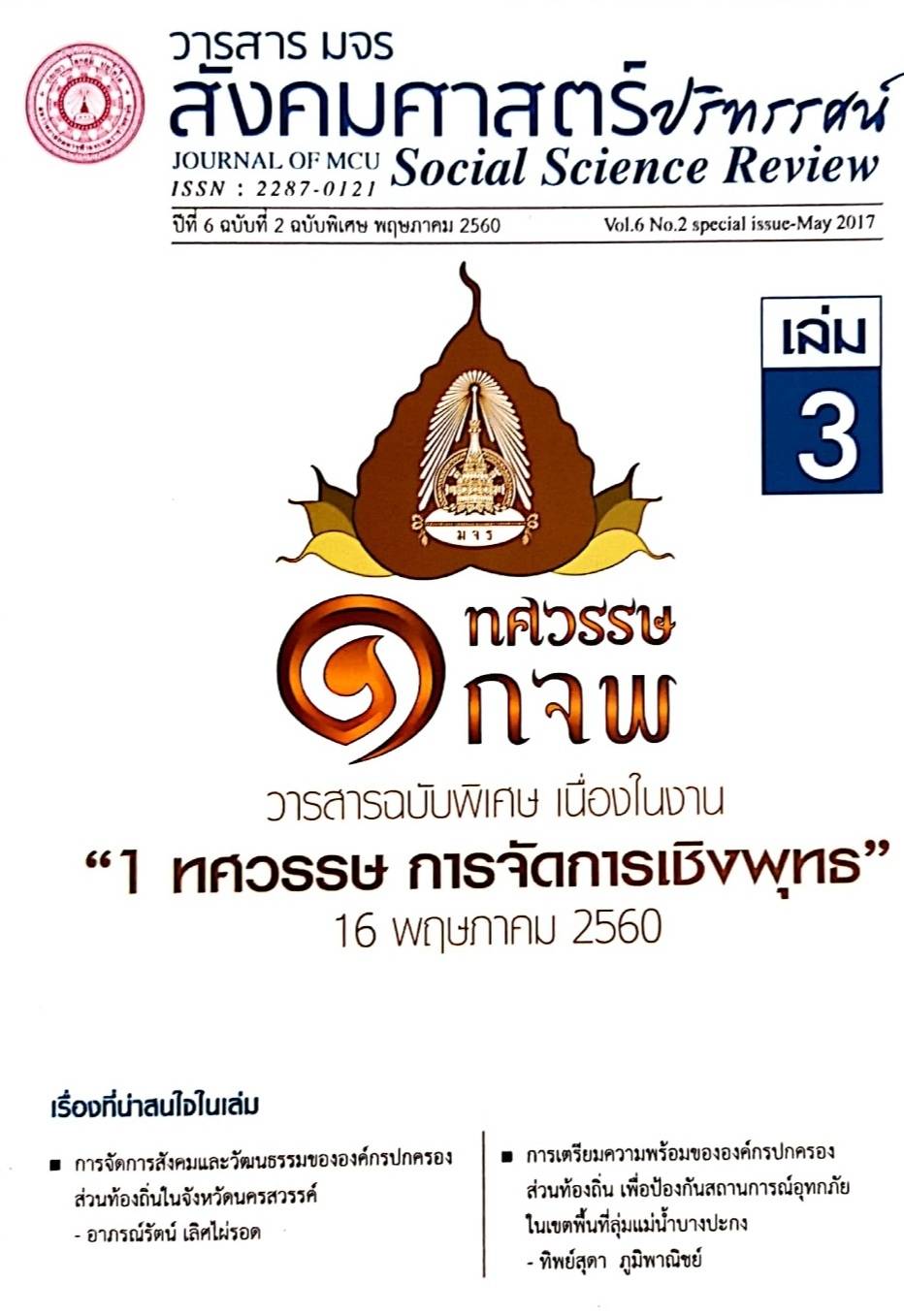รูปแบบการบริหารจัดการศูนย์อบรมเด็กก่อนเกณฑ์ในวัดเขตกรุงเทพมหานคร
คำสำคัญ:
รูปแบบการบริหารจัดการ, ศูนย์อบรมเด็กก่อนเกณฑ์ในวัดบทคัดย่อ
ผลการวิจัยพบว่า
1) สภาพทั่วไปในการบริหารจัดการศูนย์อบรมเด็กก่อนเกณฑ์ในวัด เขตกรุงเทพมหานคร พบว่า สภาพทั่วไปแบ่งเป็นสภาพทั่วไปภายในและภายนอก โดยสภาพทั่วไปภายในนั้นแบ่งการบริหารจัดการเป็นสี่ด้านหลัก ได้แก่ การบริหารงานวิชาการ การบริหารงานทั่วไปการบริหารงานธุรการ การบริหารงานบุคคล ซึ่งในแต่ละด้านต่างก็มีจุดประสงค์หลักในการดำเนินการ ดังนี้ การบริหารงานวิชาการมีจุดประสงค์หลักในการพัฒนา เพื่อการเตรียมความพร้อมให้กับเด็กก่อนเกณฑ์ทั้ง 4 ด้าน คือ ด้านร่างกาย ด้านสติปัญญา ด้านพัฒนาทางอารมณ์ ด้านการพัฒนาทางสังคม การบริหารงานทั่วไปมีจุดประสงค์หลักในการพัฒนา เพื่อให้เกิดการบริหารจัดการที่มีการวางแผน การจัดองค์กร การวินิจฉัยสั่งการ การควบคุม อย่างครบวงจรในการบริหารงานทั่วไป การบริหารงานธุรการมีจุดประสงค์หลักในการพัฒนา เพื่อให้องค์กรมีความรู้เกี่ยวกับการดาเนินการด้านเอกสารธุรการเพื่อเก็บเป็นหลักฐาน เพื่อการสืบค้น เพื่อความเป็นระเบียบและเพื่อความเป็นหมวดหมู่ การบริหารงานบุคคล มีจุดประสงค์หลักในการพัฒนา เพื่อมุ่งเน้นกระบวนการในการบริหารงานบุคคล นั่นคือ กระบวนการสรรหาบุคลากร การอบรมพัฒนา การสร้างแรงจูงใจและความคุ้มค่าของบุคลากรภายในศูนย์ ในส่วนสภาพทั่วไปภายนอก พบว่า โครงสร้างของศูนย์อบรมเด็กก่อนเกณฑ์ในวัดนั้นขึ้นอยู่กับฝ่ายพัฒนาชุมชนและสวัสดิการสังคมของแต่ละเขตในกรุงเทพมหานคร ทาให้งบประมาณที่ได้เน้นการช่วยเหลือผู้ปกครอง เพื่อแบ่งเบาภาระในการเตรียมความพร้อมให้กับบุตรหลานมากกว่างบประมาณด้านการศึกษาโดยตรง ทาให้มีงบประมาณที่ใช้ในการบริหารมีน้อยไม่เพียงพอต่อการบริหารงาน จึงจาเป็นต้องใช้หลักการของผู้ที่มีจิตศรัทธาภายในชุมชนบริเวณวัด เพื่อให้การบริหารงานด้านงบประมาณมีเพียงพอต่อความต้องการ
2) หลักพุทธธรรมและแนวคิดทฤษฎีที่เกี่ยวข้องกับการบริหารจัดการภายในศูนย์อบรมเด็กก่อนเกณฑ์ในวัด เขตกรุงเทพมหานคร พบว่า หลักธรรมที่เป็นหลักในการส่งเสริมให้ จุดประสงค์ในการบริหารงานทุกส่วนสำเร็จมีดังนี้ การบริหารงานวิชาการใช้หลักธรรมภาวนา 4 (กายภาวนา ศีลภาวนา จิตภาวนา ปัญญาภาวนา) การบริหารงานทั่วไปใช้หลักธรรมจักขุมา, วิมุตติ, อคติ 4 (ฉันทาคติ โทสาคติ โมหาคติ ภยาคติ), อริยสัจ 4 (ทุกข์ สมุห์ทัย นิโรธ มรรค), สังคหวัตถุ 4 (ทาน ปิยวาจา อัตถจริยา สมานัตตตา) การบริหารงานธุรการใช้หลักธรรมอัปปมาทและขันติ การบริหารงานบุคคลใช้หลักธรรมสติสัมปชัญญะและพละ 4 (ปัญญาพละ วิริยะ อนวัชชพละ สังคหะ พละ) และการบริหารงานทุกด้านนั้นต้องใช้หลักพุทธธรรมที่นามาบริหารงานร่วมกันอย่างบูรณาการเพื่อให้จุดประสงค์ทุกๆ ด้านเกิดความสำเร็จ ได้แก่หลักอิทธิบาทธรรม 4 (ฉันทะ วิริยะ จิตตะ วิมังสา) โดยหลักอิทธิบาทธรรมนั้นต้องร่วมบริหารงานอย่างบูรณาการกับการพัฒนางาน โดยใช้หลักการของวงจรคุณภาพ (วางแผน การปฏิบัติ การตรวจสอบ การปฏิบัติเชิงพัฒนา) และวงจรความรู้ (การปรับเปลี่ยนสู่ภายนอก การปรับเปลี่ยนสู่ภายใน การปฏิสัมพันธ์ทางสังคม การผสมผสานทางความรู้) เพื่อให้ได้มาซึ่งการพัฒนารูปแบบการริหารจัดการศูนย์อบรมเด็กก่อนเกณฑ์ในวัด เขตกรุงเทพมหานคร
3) รูปแบบการบริหารจัดการศูนย์อบรมเด็กก่อนเกณฑ์ในวัด เขตกรุงเทพมหานครพบว่า รูปแบบการบริหารจัดการศูนย์อบรมเด็กก่อนเกณฑ์ในวัด ทั้ง 4 ด้านสามารถใช้รูปแบบร่วมกันได้คือ รูปแบบ DKSA (Develop Knowledge for Sharing to Assets) โดยมีหลักการดังนี้เป็นรูปแบบในการบริหารจัดการที่ใช้หลักธรรมมาบริหารจัดการเชิงพุทธบูรณาการตามความเหมาะสมของแต่ละส่วนงาน โดยมีหลักอิทธิบาทธรรมในการควบคุมหลักธรรมต่างๆ เพื่อให้เกิดความสำเร็จในการปฏิบัติและใช้หลักการพัฒนางานอย่างต่อเนื่อง โดยใช้วงจรคุณภาพ (PDCA)อย่างถูกต้องโดยเหมาะสมกับสภาพของสถานที่ และเวลาของแต่ละศูนย์อบรมเด็กก่อนเกณฑ์ในแต่ละวัด ต่อเนื่องด้วยการใช้หลักการการพัฒนาอย่างยั่งยืน โดยใช้หลักการการจัดการความรู้(Knowledge management) ซึ่งจะทาให้เกิดการพัฒนาองค์ความรู้อย่างต่อเนื่อง โดยไม่มีที่สิ้นสุดเพื่อนาความรู้เหล่านั้นนาไปแลกเปลี่ยนเรียนรู้ในลักษณะองค์กรเครือข่าย (Knowledge Sharing) ของพันธมิตรศูนย์อบรมเด็กก่อนเกณฑ์ในวัด เพื่อให้ได้มาซึ่ง “สินทรัพย์ทางความรู้” (Knowledge Assets) ซึ่งเปรียบเสมือนเป็นหลักสูตรแกนกลางในการบริหารจัดการศูนย์อบรมเด็กก่อนเกณฑ์ในวัด เขตกรุงเทพมหานคร
เอกสารอ้างอิง
กรมอนามัย, กระทรวงสาธารณสุข. (2541). หลักสูตรการอบรมผู้ดาเนินการสถานเลี้ยงและพัฒนาเด็ก (แรกเกิด-3 ปี). กรุงเทพฯ : กระทรวงสาธารณสุข.
ยุทธ ไกยวรรณ์. (2546). สถิติเพื่อการวิจัย. กรุงเทพฯ : บริษัท พิมพ์ดี จำกัด.
ณรัฐ สวาสดิ์รัตน์. (2558). “รูปแบบการพัฒนาศักยภาพการปฏิบัติงานของอาสาสมัครทหารพราน
ในจังหวัดชายแดนภาคใต้ตามหลักพุทธธรรม”. วิทยานิพนธ์พุทธศาสตรดุษฎีบัญฑิต(รัฐประศาสนศาสตร์), บัณฑิตวิทยาลัย : มหาวิทยาลัยมหาจุฬาลงกรณราชวิทยาลัย.
ฌาน ตรรกวิจารณ์. (2550). “การพัฒนาทรัพยากรมนุษย์เชิงพุทธ”. วิทยานิพนธ์ปรัชญาดุษฎีบัณฑิต (สาขาวิชารัฐประศาสนศาตร์). บัณฑิตวิทยาลัย : มหาวิทยาลัยรามคาแหง.
พัฒนสรณ์ เกียรติฐิติคุณ. (2558). “รูปแบบการบูรณาการหลักพุทธธรรมในการพัฒนาประสิทธิภาพการปฏิบัติงานของเจ้าหน้าที่เทศกิจ กรุงเทพมหานคร” วิทยานิพนธ์พุทธศาสตรดุษฎีบัญฑิต (รัฐประศาสนศาสตร์). บัณฑิตวิทยาลัย : มหาวิทยาลัยมหาจุฬาลงกรณราชวิทยาลัย.
พระมหาสมบัติ ธนปญฺโญ (ฉลอง). (2558). “ยุทธศาสตร์เชิงพุทธในการการบริหารโรงเรียนพระปริยัติธรรม แผนกสามัญ”. วิทยานิพนธ์พุทธศาสตรดุษฎีบัญฑิต (สาขาวิชาพุทธบริหสนการศึกษา), บัณฑิตวิทยาลัย : มหาวิทยาลัยมหาจุฬาลงกรณราชวิทยาลัย.
ดาวน์โหลด
เผยแพร่แล้ว
รูปแบบการอ้างอิง
ฉบับ
ประเภทบทความ
สัญญาอนุญาต
ลิขสิทธิ์ (c) 2020 วารสาร มจร สังคมศาสตร์ปริทรรศน์

อนุญาตภายใต้เงื่อนไข Creative Commons Attribution-NonCommercial-NoDerivatives 4.0 International License.
เพื่อให้เป็นไปตามกฎหมายลิขสิทธิ์ ผู้นิพนธ์ทุกท่านต้องลงลายมือชื่อในแบบฟอร์มใบมอบลิขสิทธิ์บทความให้แก่วารสารฯ พร้อมกับบทความต้นฉบับที่ได้แก้ไขครั้งสุดท้าย นอกจากนี้ ผู้นิพนธ์ทุกท่านต้องยืนยันว่าบทความต้นฉบับที่ส่งมาตีพิมพ์นั้น ได้ส่งมาตีพิมพ์เฉพาะในวารสาร มจร สังคมศาสตร์ปริทรรศน์ เพียงแห่งเดียวเท่านั้น หากมีการใช้ภาพหรือตารางหรือเนื้อหาอื่นๆ ของผู้นิพนธ์อื่นที่ปรากฏในสิ่งตีพิมพ์อื่นมาแล้ว ผู้นิพนธ์ต้องขออนุญาตเจ้าของลิขสิทธิ์ก่อน พร้อมทั้งแสดงหนังสือที่ได้รับการยินยอมต่อบรรณาธิการ ก่อนที่บทความจะได้รับการตีพิมพ์ หากไม่เป็นไปตามข้อกำหนดเบื้องต้น ทางวารสารจะถอดบทความของท่านออกโดยไม่มีข้อยกเว้นใดๆ ทั้งสิ้น





